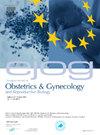精子染色质压缩调节因子的新遗传变异与印度男性非阻塞性无精子症有关
IF 1.9
4区 医学
Q2 OBSTETRICS & GYNECOLOGY
European journal of obstetrics, gynecology, and reproductive biology
Pub Date : 2025-10-08
DOI:10.1016/j.ejogrb.2025.114762
引用次数: 0
摘要
特发性男性不育症的遗传基础在很大程度上仍然是难以捉摸的和多因素的。精子细胞在精子发生过程中经历了不同的染色质压缩,主要是由精子特异性核蛋白-精蛋白(PRMs)和过渡蛋白(TNPs)驱动的。鱼精蛋白簇的遗传变异可能导致男性不育。然而,它们对不同种族的精子DNA完整性和生育结果的影响仍然不一致和不清楚。然而,这些基因变异尚未在男性不育的印度男性中进行研究。方法收集来自印度西孟加拉邦孟加拉语人群的非阻塞性无精子症男性血样,对445例非阻塞性无精子症(y染色体微缺失阴性)和375例可育对照进行PRM1、PRM2、TNP1和TNP2基因的Sanger测序分型。采用合适的统计方法检验变异相关性。此外,采用计算机分析来预测鉴定的变异的潜在有害影响。结果共检出15个变异,其中10个变异与无精子症有显著相关性。计算机分析预测有5种变异可能对该基因的功能有害或致病:rs75245770C>;A和PRM1中的新变异OQ266297C>;A;PRM2中的新变体OQ507618A>;T和OQ557494G>;T;TNP2中的rs11640138C>;T。结论鱼精蛋白基因簇变异可能与孟加拉男性无精子症发病风险增加有关。本研究中发现的新变异具有在常规辅助生殖技术(ART)实践中作为男性不育筛查遗传标记的潜力。本文章由计算机程序翻译,如有差异,请以英文原文为准。
Novel genetic variants of sperm chromatin compaction regulators are associated with non-obstructive azoospermia in Indian men
Background
The genetic basis of idiopathic male infertility remains largely elusive and multifactorial. Sperm cells undergo distinct chromatin compaction during spermiogenesis, primarily driven by sperm-specific nuclear proteins—protamines (PRMs) and transition proteins (TNPs). Genetic variations in protamine clusters due to polymorphisms may contribute to male infertility. However, their impact on sperm DNA integrity and fertility outcomes across ethnic groups remains inconsistent and unclear. However, these gene variants have not been studied among the Indian men in the context of male infertility.
Methods
This case-control study include collection of blood samples from non-obstructive azoospermic men from Bengali speaking population of West Bengal, India followed by genotyping with Sanger’s sequencing of PRM1, PRM2, TNP1 and TNP2 genes among 445 non-obstructive azoospermic individuals (negative for Y-chromosome microdeletions) and 375 fertile controls. Suitable statistical methods were used to examine variant association. Additionally, in silico analyses were employed to predict the potential deleterious effects of the identified variants.
Results
A total of 15 variants were identified, of which 10 showed significant association with azoospermia among the cases. In silico analyses predicted five variants to be potentially deleterious to the gene’s function or disease-causing: rs75245770C>A and the novel variant OQ266297C>A in PRM1; the novel variants OQ507618A>T and OQ557494G>T in PRM2; and rs11640138C>T in TNP2.
Conclusion
Variants in protamine gene cluster may contribute to an increased risk of azoospermia among men in Bengali population. The novel variants identified in this study hold potential as genetic markers for male infertility screening in routine assisted reproductive techniques (ART) practice.
求助全文
通过发布文献求助,成功后即可免费获取论文全文。
去求助
来源期刊
CiteScore
4.60
自引率
3.80%
发文量
898
审稿时长
8.3 weeks
期刊介绍:
The European Journal of Obstetrics & Gynecology and Reproductive Biology is the leading general clinical journal covering the continent. It publishes peer reviewed original research articles, as well as a wide range of news, book reviews, biographical, historical and educational articles and a lively correspondence section. Fields covered include obstetrics, prenatal diagnosis, maternal-fetal medicine, perinatology, general gynecology, gynecologic oncology, uro-gynecology, reproductive medicine, infertility, reproductive endocrinology, sexual medicine and reproductive ethics. The European Journal of Obstetrics & Gynecology and Reproductive Biology provides a forum for scientific and clinical professional communication in obstetrics and gynecology throughout Europe and the world.

 求助内容:
求助内容: 应助结果提醒方式:
应助结果提醒方式:


